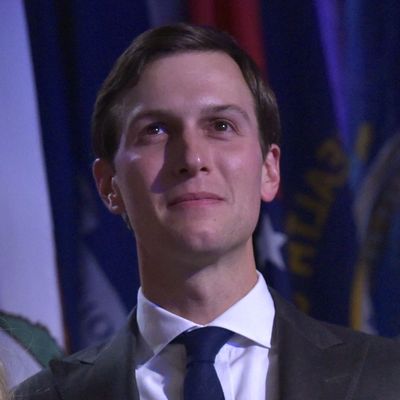
In an attempt to show that Donald Trump is making good on his campaign promise to “drain the swamp,” on Wednesday the campaign announced that anyone who joins the administration will be banned from lobbying for five years. Trump’s ethical stand was undercut by reports that he wants to refill the swamp with a family member.
Trump’s son-in-law, Jared Kushner, is likely to take a job at the White House, according to The Wall Street Journal. Sources tell the paper that both White House chief of staff Reince Priebus and presidential counselor Stephen Bannon are urging Kushner to take a formal position, such as senior adviser or special counsel.
He could also continue advising his father-in-law in an unofficial capacity, but there’s reason to think there’s more to the report than other rumors coming out of Trump Tower. Kushner’s wife, Ivanka Trump, speculated that if he took an official position the family would need to relocate to D.C., telling the paper that would indicate “Jared recognizes and is inspired by the incredible opportunity to make a positive impact for America.”
The 35-year-old grew up in a New Jersey real-estate family and became one of his father-in-law’s top campaign advisers, stepping in to upgrade the anemic campaign infrastructure, weighing in on details like ad spending and venues for campaign events, and negotiating between feuding factions within the Trump team.
Kushner generally avoids the spotlight, but he’s drawn attention in recent days over reports that he led a “purge” of Chris Christie supporters from the transition team. Christie was the federal prosecutor who sent Kushner’s father to jail in 2005 for tax evasion, witness tampering, and making illegal campaign donations. It was revealed during the trial that Charles Kushner retaliated against his brother-in-law for cooperating with the feds by hiring a prostitute to seduce him, having the encounter recorded, and sending it to his sister. Christie said after the sentencing, “This sends a strong message that when you commit the vile and heinous acts that he has committed you will be caught and punished.”
Kushner does have something in common with his father-in-law: As the chief executive of the real-estate firm Kushner Companies and publisher of Observer Media, Kushner deciding to take a government role would present complex conflicts of interest. According to the Journal, he’s considered that:
To address potential conflicts of interest with his real-estate business, which has closed some $14 billion in deals under his leadership, Mr. Kushner’s lawyers are exploring options of possible “structures.” One option would be a blind trust over which he would have no control or access. He would agree to suspend receiving any income or distribution from his real-estate and media holdings, people familiar with his thinking said.
But of course, that’s not the biggest issue with Kushner taking a White House job. A 1967 law, which is seen as a response to President Kennedy making his brother attorney general, bans public officials from hiring their relatives. The Journal suggests there could be a simple workaround:
It isn’t clear whether a federal anti-nepotism law that bans appointing a relative to a job in an “agency” applies to the White House, and Mr. Kushner has indicated he would avoid the issue by not taking pay for any White House work.
However, the law explicitly states that it applies to the president, and that a son-in-law counts as a relative. This is how the ban is worded:
A public official may not appoint, employ, promote, advance, or advocate for appointment, employment, promotion, or advancement, in or to a civilian position in the agency in which he is serving or over which he exercises jurisdiction or control any individual who is a relative of the public official.
Both Republican and Democratic attorneys told Politico that they believe the law prohibits Kushner from taking a White House job:
“We’re not talking about Kushner running a side task force here. We’re talking about a regular staff job. This falls right in the bull’s eye of the statute. I think it’s illegal,” said Norm Eisen, the former chief ethics lawyer in the Obama White House.
Added Richard Painter, who had a similar post in the George W. Bush White House, “He cannot take a take a job in the White House. Highly inappropriate … I don’t know why they think they can. Just read the language in the statute.”
Legal experts consulted by the New York Times said there’s no prohibition on Kushner serving as an unpaid adviser. Sources in the Trump transition team said that contrary to previous reports, the president-elect does not intend to seek security clearance for Kushner or Ivanka Trump. But if Trump changes his mind, there’s not much stopping him. The paper suggested Kushner could be appointed to the president’s Intelligence Advisory Board, a 16-member committee that advises the president on intelligence matters. Experts say the president can essentially give security clearance to whomever he wants, even overriding red flags in their FBI background check.
If he chooses that option, Kushner could have all the access he wants without the pesky legal challenges — and it seems like the last thing the incoming administration needs is more legal drama.






























